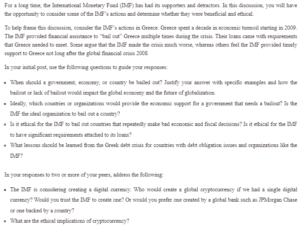The International Monetary Fund
The International Monetary Fund (IMF) supports countries facing extreme financial crises. The primary objective is to provide these countries with breathing space as they restrategize their policies to retain economic stability growth (International Monetary Fund, 2019). Such aid can also be a precautionary measure to help countries from falling into a financial crisis. IMF loans resolve short-term financial obligations. However, some critics argue that the program creates a moral hazard for some countries.
Member countries primarily provide financing for the IMF via quota payment. Also, the institution facilitates bilateral and multilateral funding among member states. The world’s wealthiest countries, like the US, France, Germany, the UK, Italy, Japan, and Canada (the G7), are the main financiers (Li et al., 2015). However, the appropriateness of the IMF as a lending institution is often questioned and remains controversial.
Despite the benefits of the IMF in alleviating financial crises, its ethical standard is often questioned. One of the IMF’s lending practicIMF’sten questioned is the tendency to repeatedly lend to countries that continually make poor financial decisions (Li et al., 2015). Lending to such countries creates a moral hazard, such that they make mistakes expecting to be bailed out, regardless. For instance, Italy and Greece are accused of continually making unsustainable budgets, expecting partner nations to bail them out through the IMF (Stournaras 2019). Such a moral hazard is akin to the problems created when a government continually bails out public parastatals and commercial banks.
According to Stournaras (2019), several lessons can be drawn from Greece’s debt situation, including safeguarding public institutions. Public institutions’ independence and proper functioning are vital to a nation’s economic growth, so there is a need to safeguard the confidence of foreign investors to attract foreign direct investments (FDI). Accordingly, this can be achieved by reducing bureaucracy, legislative ambiguity, and punitive taxes. Also, investing more in research and development, education, and digitalization will enhance ICT share on GDP, hence more economic stability.
References
International Monetary Fund. (2019). IMF Lending. IMF. https://www.imf.org/en/About/Factsheets/IMF-Lending
Li, L., Sy, M., & McMurray, A. (2015). Insights into the IMF bailout debate: A review and research agenda. Journal of Policy Modeling, 37(6), 891–914. https://doi.org/10.1016/j.jpolmod.2015.09.007
Stournaras, Y. (2019). Lessons from the Greek Crisis: Past, Present, Future. Atlantic Economic Journal, 47(2), 127–135. https://doi.org/10.1007/s11293-019-09615-8
ORDER A PLAGIARISM-FREE PAPER HERE
We’ll write everything from scratch
Question 
For a long time, the International Monetary Fund (IMF) has had its supporters and detractors. In this discussion, you can consider some of the IMF’s actions and determine whether they were beneficial and ethical.

The International Monetary Fund
To help frame this discussion, consider the IMF’s actions in GreeIMF’sreece spent a decade in economic turmoil starting in 2009. The IMF provided financial assistance to “bail out” Greece multiple times “s during the crisis. Their loans came with requirements that Greece needed to meet. Some argue that the IMF made the crisis much worse, whereas others feel the IMF provided timely support to Greece not long after the global financial crisis 2008.
In your initial post, use the following questions to guide your responses:
- When should a government, economy, or country be bailed out? Justify your answer with specific examples and how the bailout or lack of bailout would impact the global economy and the future of globalization.
- Ideally, which countries or organizations would provide the economic support for a government that needs a bailout? Is the IMF the ideal organization to bail out a country?
- Is it ethical for the IMF to bail out countries that repeatedly make bad economic and fiscal decisions? Is it ethical for the IMF to have significant requirements attached to its loans?
- What lessons should be learned from the Greek debt crisis for countries with debt obligation issues and organizations like the IMF?
In your responses to two or more of your peers, address the following:
- The IMF is considering creating a digital currency. Who would create a global cryptocurrency if we had a single digital currency? Would you trust the IMF to create one? Or would you prefer one created by a global bank such as JPMorgan Chase or one backed by a country?
- What are the ethical implications of cryptocurrency?